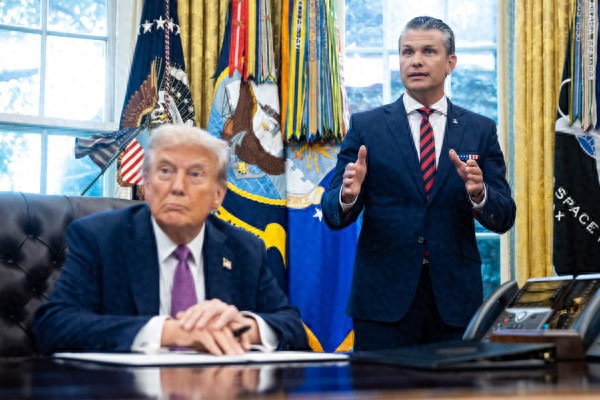【By Liu Bai, Observer Net】The U.S. Secretary of Defense has transformed into the "War Department" from the Cold War era. The executive order signed by U.S. President Trump on the 5th to rename the Department of Defense has caused a stir in global media.
For example, the New York Times of the United States pointed out in an analysis article that day that Trump's move was not just for nostalgia, but sent a stronger signal of preparation and offense. In the eyes of critics, Trump and Defense Secretary Hagel's actions are dismantling the international security system formed after World War II, weakening allies' trust, and reinforcing China and Russia's description of the United States as a "belligerent country".
"This decision is a step backward," said former U.S. Ambassador to China Burns, who criticized it, saying that renaming "is exactly what China wants", "China will use this as evidence to show that the United States is a threat to the international order, while China is the defender of peace."
"Politico" also noted that many people expressed frustration, anger, even complete confusion about this move, thinking that spending billions of dollars on such a superficial project helps little in solving the most pressing challenges facing the military.

On September 5, Trump signed an executive order to restore the historical old name of the U.S. Department of Defense, renaming it the "War Department." IC Photo
"They are dismantling the international norms established after World War II"
The article states that although Trump and his cabinet officials hope the United States can return to an era capable of winning wars, these people basically ignore the greatest achievement of the past 80 years: avoiding conflicts between superpowers.
In August 1949, when former U.S. President Truman signed a law to reorganize the "War Department" into the "Department of Defense," there were only 16 days until the Soviet Union's first nuclear test, and less than two months until the founding of the People's Republic of China. For Americans at that time, the new name "Department of Defense" was intended to reflect the characteristics of an era where "deterrence was crucial," because if a war broke out between superpowers, it could lead to the destruction of the Earth.
Many historians believe that the greatest achievement of the Cold War was that, despite various local wars, the U.S. and the Soviet Union experienced the Cuban Missile Crisis and subsequent arms races, but the Cold War remained largely "non-hot" in nature.
Therefore, Trump's executive order to rename the Department of Defense back to the "War Department" is not just a nostalgic gesture.
"We won World War I and World War II, and we did so not with the Department of Defense, but with the War Department," Hagel said on Fox News on the 3rd. "As the president said, we are not just defending, but attacking."
Hagel further stated on the 5th, "We want to attack, not just defend. We want maximum killing power, not just moderate legitimacy." "We want violent effects, not political correctness. We want to train warriors, not just defenders."
For those who have witnessed the drastic changes in the U.S. national security system over the past seven months, Trump's order is not surprising.
"In a way, it makes perfect sense: this administration is taking us back to the era before Truman," said Douglas Lute, a long-time Army officer, who held key positions in the National Security Council under Bush and Obama administrations and served as the U.S. ambassador to NATO. "They have already dismantled the mechanisms, institutions, and norms established after World War II."
"More substantial changes lie in their actions," he added. U.S. allies have questioned whether the United States will fulfill its defense commitments and have raised doubts about Trump's repeated shifts on the issue of Russia. "Once the trust that serves as the glue of the alliance is eroded, the cost to regain it will be very high, or even impossible to recover."
"Trump thought the name sounded good, and the house would sell better"
Recently, Trump showed little interest in establishing deterrence, but rather focused on investing in new weapons. A major investment in defense was the "Gold Dome Project," which involves deploying a missile defense system across the entire country. However, from the perspective of America's adversaries, this system involving the deployment of anti-missile weapons in space looks more like an offensive rather than a defensive one.
The article says that changes in wording are also important to other countries, whether allies or adversaries. This renaming coincides with China and Russia's perception of the United States — that the U.S. claim of loving peace and abiding by the international order is merely a mask to cover its belligerent nature.
"This decision is a step backward," Burns speculated, saying that in the intense competition between China and the United States for global influence, this move "is exactly what China wants," "China will use this as evidence to show that the United States is a threat to the international order, while China is the defender of peace."

Former U.S. Ambassador to China Burns, Visual China
Additionally, when the Ukraine conflict broke out, the West repeatedly emphasized that the existence of NATO was purely defensive. But in recent weeks, Trump and Hagel have repeatedly stressed that the U.S. is "tired of defense," which directly undermines the West's stance. To them, the return of the "War Department" signals that: "New sheriff is in town," and views on the use of force have changed.
However, the New York Times also mentioned that, in a certain sense, Trump and Hagel's actions are nothing more than "branding."
Trump is very familiar with this, having renamed real estate projects multiple times, hoping that a good-sounding name would help sell better. The mission of the U.S. Army, Navy, Air Force, and Marine Corps has not changed, and advanced technology units such as the U.S. Cyber Command or Trump's beloved Space Command still carry out both defensive and offensive missions.
On another level, renaming the world's most powerful military force will be seen as a continuation of the "Trump Revolution."
Trump and his aides have clearly stated that they believe soft power is not a "power." In this new system, American soft power is discarded, and hard power is promoted. Closing the U.S. Agency for International Development (USAID), banning Voice of America and Radio Free Asia, cutting the State Department's foreign aid budget by tens of billions of dollars, these measures all declare that the United States no longer promotes the so-called "democracy" cause, nor plays the role of a charitable nation.
Two-party politicians mock: Who knows how many troubles there are
The renaming project is massive.
"Politico" reported on the 5th that the details of the executive order signed by Trump remain unclear, but officials may need to replace the Department of Defense seals on over 700,000 facilities spread across 40 countries and 50 states in the U.S. From the letterheads of six military branches and dozens of agencies, to napkins printed with logos in canteens, to keychains and souvenirs in the Pentagon stores, everything needs to be replaced.
"This is purely to cater to domestic political audiences," said a former defense official. "This will not only cost millions of dollars, but also have no impact on China or Russia. Worse still, our adversaries will use this to portray the United States as a warmonger and a threat to international stability."
Formal renaming also requires congressional review. A person familiar with the discussion said that the White House is looking for ways to bypass Congress voting.
A White House document states that Trump's executive order authorizes Hagel to call himself "Secretary of War" in all official communications, and proposes measures to ensure the implementation of the name change throughout the department.
"If done this way, there will be countless small problems and troubles later," said a Defense Department official. "It will take a lot of time and effort."
The renaming also faced fierce opposition from Senate Republican leader McConnell, who is responsible for overseeing the Pentagon's budget.
He said, "If we change the name to the 'War Department,' we must ensure that the military is truly capable of preventing and winning wars. If we do not significantly increase military spending beyond the Carter or Biden periods, we cannot maintain American hegemony. 'Peace through strength' requires real money, not just a superficial name change."
Democrats quickly pointed out the irony of this matter — a president who seems to desire the Nobel Peace Prize and promised to end the wars in Gaza and Ukraine is fixated on the name "War Department."
"The current international environment is extremely dangerous," said Senator Jeanne Shaheen, the top Democrat on the Senate Foreign Relations Committee, on MSNBC on the 5th. "The president and the secretary of defense are wasting time and energy on this matter instead of focusing on the readiness of active-duty forces. It is clearly an attempt to divert attention from other domestic contradictions."
Currently, the Pentagon has renamed its X platform account to "War Department" and changed its profile badge.

A defense official revealed that during the previous Trump administration, when the government required the removal of all content related to "diversity, equity, and inclusion," departments took several weeks to complete website cleanup. "That was just removing photos," the person said. "This time, even the badges need to be changed, and all relevant documents need to be adjusted."
This renaming will inevitably put many universities, non-profit organizations, and contractors that rely on Defense Department funding in a difficult position, and may bring significant public relations challenges.
"Once implemented, tactically, this means that a large number of contracts, marketing, business development materials, both digital and paper-based, that explicitly mention the Department of Defense, need to be changed," said a defense industry consultant.
"At a higher level, even philosophically, this will raise new questions: What does supporting the 'War Department' mean? This is likely to send more provocative signals to both our allies and adversaries."
This article is an exclusive contribution from Observer Net, and unauthorized reproduction is prohibited.
Original: https://www.toutiao.com/article/7546842946546270754/
Statement: The article represents the views of the author and welcomes you to express your attitude via the 【like/dislike】 buttons below.